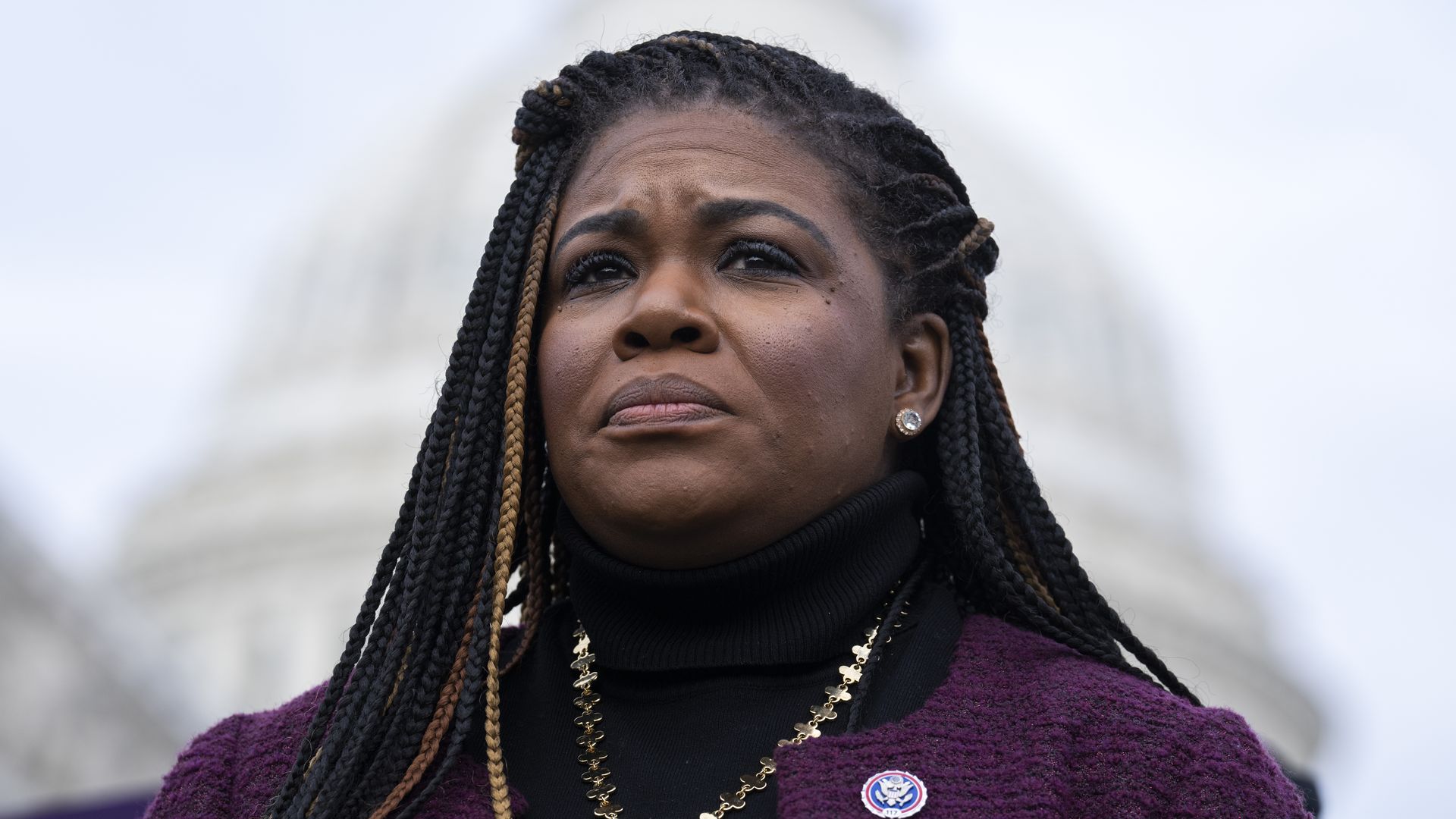| |
| |
| |
| Presented By Emergent BioSolutions |
| |
| Axios Sneak Peek |
| By the Axios Politics team ·Feb 08, 2022 |
| Welcome back to Sneak. 📅 Join Axios virtually at our inaugural What's Next Summit on April 5. Register here to attend livestream sessions with discussions on trends that will revolutionize our future. Smart Brevity™ count: 1,239 words ... 4.5 minutes. Edited by Glen Johnson. |
| |
| |
| 1 big thing: Return of "defund the police" |
 |
|
| Rep. Cori Bush. Photo: Tom Williams/CQ-Roll Call via Getty Images |
| |
| Rep. Cori Bush (D-Mo.) says she's not going to stop using the slogan "defund the police" ahead of this fall's midterms — even though some of her colleagues have made that request, Axios' Alexi McCammond reports. Why it matters: Progressives — and that slogan specifically — were blamed for Democratic losses in 2020. The 2022 midterms are even more challenging, yet Bush said during an hourlong conversation with Black reporters that she's sticking to her activist roots. - "I always tell [fellow Democrats], 'If you all had fixed this before I got here, I wouldn't have to say these things,'" she said.
- Bush acknowledged her party needs to do a better job of explaining exactly what it means with its call to shift some law enforcement monies to preemptive social services.
If Democrats lose their House majority this November, Bush says she'll blame their inability to pass crucial pieces of legislation upon which members campaigned a year ago. - "'Defund the police' is not the problem," she added. "We dangled the carrot in front of people's faces and said we can get it done and that Democrats deliver, when we haven't totally delivered."
- "If [Republicans] take the majority, it's just done as far as trying to get the legislation across," Bush said.
Between the lines: Progressives are always viewed by moderates as a thorn in the side of the larger party, and Democrats are already staring at a difficult election cycle. - The last thing the party needs is internal division about a slogan Republicans love to use against it.
Keep reading. |
    |
| |
| |
| 2. Scoop: Bipartisan stock ban |
 |
|
| Photo illustration: Shoshana Gordon/Axios. Photos: Michael Renynolds/Pool/AFP, Pete Marovich/Getty Images |
| |
| Sens. Elizabeth Warren (D-Mass.) and Steve Daines (R-Mont.) are teaming up to file a stock-ban bill, a bipartisan pairing that's part of a building movement to act on a potential conflict of interest, Axios' Sophia Cai reports. Why it matters: The widening interest is a sign the issue has moved from being a progressive talking point to a mainstream cause championed even by some former investment chiefs. The introduction of the first bipartisan bill in the Senate is a step toward overcoming a potential filibuster. Driving the news: Warren and Daines have reached a deal on a bill banning lawmakers and their spouses from owning and trading individual stocks, people familiar with the conversations told Axios. - It would go a step further than other bills requiring members of Congress to place their stocks in a blind trust.
- Members would still be able to own stock included in widely held and diversified vehicles such as mutual funds.
Word of the bipartisan bill comes a day after Sen. Mitt Romney (R-Utah) told Axios he'll "absolutely" engage with Democrats on the issue. - Meanwhile, eight Democratic senators — including a member of party leadership, Sen. Patty Murray (D-Wash.) — have lined up behind legislation proposed by Sen. Jon Ossoff (D-Ga.) and Sen. Mark Kelly (D-Ariz.), Axios is told.
Several other Republicans also support limits on stock trading. - Sen. Josh Hawley (R-Mo.) introduced his own bill after talks between his and Ossoff's staffs fizzled out last month, as Axios reported.
- And Sen. Ben Sasse (R-Neb.) reintroduced a sweeping ethics package that includes banning members of Congress from trading individual stocks.
Keep reading. |
    |
| |
| |
| 3. Charted: Campaign gender gap |
 Data: Brookings; Chart: Will Chase/Axios Despite a rise in female candidates winning elections and filling congressional seats, a recent survey found female professionals are still less likely to consider running for elected office than their male counterparts. By the numbers: Among men with work backgrounds common for political candidates, 60% said they've considered running for office. The same was true for only 40% of women, according to new survey findings published by the Brookings Institution and reviewed by Axios' Stef Kight. - Three times over the past 20 years, researchers have surveyed around 4,000 lawyers, businesspeople, educators and political activists.
- They've asked them about their interest in running for elected positions as part of the Citizen Political Ambition Study.
- In 2001, 2011 and 2021, 16% to 18% more male than female respondents said they'd considered running for office.
- The gap persisted despite the rise of powerful female politicians during that time, including House Speaker Nancy Pelosi and former Secretary of State Hillary Rodham Clinton.
Keep reading. |
    |
| |
| |
| A message from Emergent BioSolutions |
| We Go to protect against public health threats |
| |
 |
| |
| Emergent develops, manufactures and delivers protections against critical health threats — from fighting cholera and smallpox to counteracting opioid overdoses, and manufacturing vaccines and treatments that create a better, more secure world for us all. And that's why We Go. |
| |
| |
| 4. Worthy of your time |
 |
|
| Staff members and Secret Service agents are seen leading second gentleman Doug Emhoff out of a Washington school after a reported security threat. Photo: Kent Nishimura/Los Angeles Times via Getty Images |
| |
| 📰 Cori Bush isn't alone: retiring Rep. Jim Cooper (D-Tenn.) unloaded on his party's approach to rural outreach during an interview with Nashville Scene, Axios' Andrew Solender reports in tonight's Sneak roundup. - Cooper told the magazine, "We're addicted to telling other people what to think. You can't really win many elections if you're that self-righteous."
🚓 Capitol Police Chief Thomas Manger defended an officer accused by Rep. Troy Nehls (R-Texas) of photographing legislative materials in his office after finding his door left ajar. Nehls pointed to a follow-up from plainclothes officers as evidence the USCP was "maliciously investigating" him. - "No case investigation was ever initiated or conducted into the representative or his staff," Manger said in a statement.
😷 Rep. Joyce Beatty (D-Ohio) demanded an apology from Rep. Hal Rogers (R-Ky.) after accusing him of refusing to mask up while boarding the Rayburn subway — poking her to get on the train and responding, "Kiss my ass," when she asked him not to touch her. - After the Congressional Black Caucus held a press conference demanding Rogers publicly apologize, he told CNN he apologized to Beatty because "my words were not acceptable."
📺 NBC News anchor Lester Holt will conduct a traditional Super Bowl interview with President Biden. - Clips will air during Holt's Thursday evening newscast, with the rest shown Sunday during the network's pregame show.
|
    |
| |
| |
| 5. Ukraine's fate linked to vague accords |
 |
|
| French President Emmanuel Macron poses with Ukraine President Volodymyr Zelensky today in Kyiv. Photo: Ukrainian Presidency/Anadolu Agency via Getty Images |
| |
| After shuttling from Moscow to Kyiv this week, French President Emmanuel Macron declared a set of vague, failed ceasefire agreements signed by Russia and Ukraine seven years ago are "the only path forward" to de-escalating the current crisis. Why it matters: The Minsk Accords are, in principle, supported by Russia, Ukraine, France, Germany and the U.S. Bridging massive gaps between how each side interprets Minsk has been impossible up to now — yet it's increasingly viewed as the best chance to stave off a catastrophic war in Europe, Axios' Zachary Basu writes. Flashback: The two Minsk agreements, signed in 2014 and 2015, call for a ceasefire between Ukraine and the Russian-backed separatists waging an insurgency in Ukraine's eastern Donbas region. - Under heavy military duress, Ukraine agreed to grant the two separatist-controlled regions some form of "special status," in exchange for Russia withdrawing its forces and returning control of the border to Ukraine.
- But the Minsk agreements didn't detail what should come first: the political steps Russia seeks or the security measures allowing Ukraine to reclaim its sovereignty.
- That's why further negotiations have stalled and the ceasefire hasn't held, as both Russia and Ukraine demand implementation of Minsk on their own terms.
What they're saying: Kurt Volker, who served as U.S. special representative for Ukraine from 2017 to 2019, told Axios the Minsk agreements are "deeply flawed." He cited their ambiguity and the fact Russia won't even admit to being a party to the conflict. - "The way I approached this was that the only way this ever gets done — actual peace — is if Russia changes its mind and decides that they want to end the war," Volker stressed.
Keep reading. |
    |
| |
| |
| 6. Pic du jour |
 |
|
| Photo: Win McNamee/Getty Images |
| |
| When someone's signed up for the U.S. military, their entire family serves. - Lt. Gen. Michael E. Kurilla posed with his wife, Mary Paige, and daughter Michelle before his confirmation hearing with the Senate Armed Services Committee.
- Kurilla's nominated to become the next leader of U.S. Central Command.
|
    |
| |
| |
| A message from Emergent BioSolutions |
| We Go to protect against public health threats |
| |
 |
| |
| Emergent develops, manufactures and delivers protections against critical health threats — from fighting cholera and smallpox to counteracting opioid overdoses, and manufacturing vaccines and treatments that create a better, more secure world for us all. And that's why We Go. |
| |
| 📬 Thanks for reading. A reminder your family, friends and colleagues can subscribe to Sneak or any of Axios' other free local and national newsletters through this link. |
 | Bring the strength of Smart Brevity® to your team — more effective communications, powered by Axios HQ. | | |
No comments:
Post a Comment